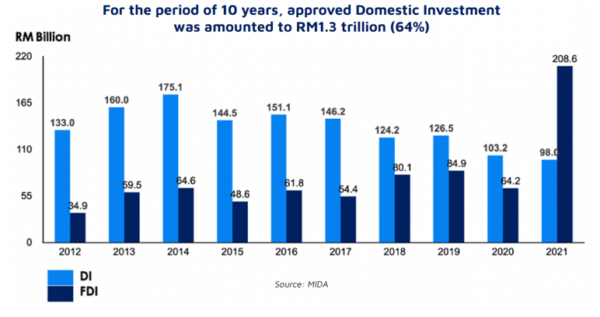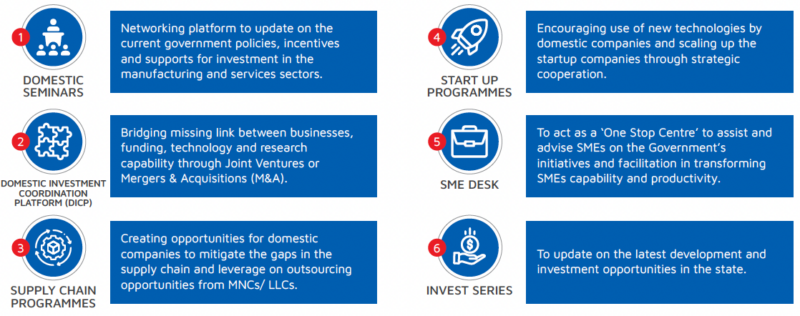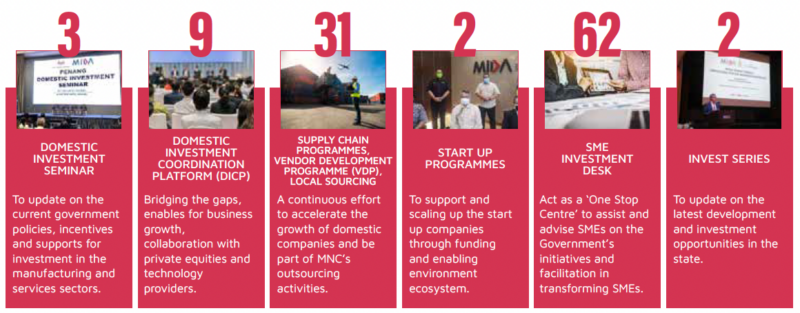
This site
is mobile
responsive

The Malaysian Investment Development Authority (MIDA) through the Domestic Investment Division (DI) and MIDA State Offices, continuously strives to\ maintain investment momentum and undertake domestic investment promotion activities by strengthening the country’s business ecosystem.
MIDA’s activities are driven by the domestic investment strategies embedded in the Twelfth Malaysia Plan (RMK12), National Investment Aspirations (NIAs) and the New Industrial Master Plan (2021-2030). With these policies in mind, MIDA aims to transform the domestic investment landscape. For the past decade, MIDA has executed strategic measures to boost domestic investments including policy intervention, strategic funds and incentives, COVID-19-related stimulus measures, and incentives to attract investors in the era of automation and Industry 4.0 adoption.
Domestic Initiatives
In 2012, MIDA spearheaded several game changing measures to further promote the development of domestic investments. These measures were successful in spurring domestic investments and assisted Malaysia in transforming the local investment landscape. The initiatives are:
Domestic Initiative in 2012
Battling the COVID 19 Pandemic
To address the various socioeconomic impacts of the COVID-19 pandemic as well as the weakening global economy, the Malaysian government introduced eight (8) economic stimulus packages totalling RM530 billion to ensure the well-being of Malaysians and the survival of businesses.
For the business community, several initiatives laid the foundation for financial support and improved business sentiment. Here are some of the initiatives undertaken by MIDA during the pandemic:
Era of Automation & Industry 4.0 Adoption
At the same time, the Malaysian Government has continuously urged businesses, particularly small and medium-sized enterprises (SMEs), to implement digitalisation and adopt innovation in their business to remain resilient.
Malaysia’s Industry4WRD policy is an excellent guide and the incentives such as the Industry4WRD Readiness Assessment and its subsequent Intervention Fund enables domestic companies to assess their capabilities and readiness to adopt Industry 4.0 processes, understand their present capabilities and gaps, as well as prepare feasible plans to move toward effective adoption of Industry 4.0.
Other critical enablers are skilled talent and upskilling programmes to drive and sustain Malaysia’s economic growth. The availability of a skilled workforce will support the transition of all economic sectors towards knowledge-intensive activities. The government had also introduced the Automation Capital Allowance, a major initiative to motivate domestic companies to undertake automation and machine upgrading.
Domestic Investment Performance
In the past few years, efforts to channel domestic direct investment (DDI)-led investments into the economy have yielded positive results.

There has been a misconception that the government is over focusing and incentivising foreign investors rather than local players. In reality, domestic players enjoy more investment incentives compared with foreign investors. Domestic investment has been a major contributor to approved investments in the Malaysian economy. For the past 10 years, approved domestic investments amounted to RM1.3 trillion, accounting for 64% of total approved investments. During the period, DDI dominated the service sector at 84.2% or about RM1.01 trillion, while foreign direct investment (FDI) accounted for 15.8% or RM190.4 billion.
The Future of DDI in Malaysia
The government offers 131 incentives and assistance programmes across various economic sectors (manufacturing, services and primary sectors). All these incentives target and support local companies. In manufacturing, targeted incentives cover common activities such as research and development (R&D), Product Design/ Commercialisation, Production, Distribution, and Marketing.
MIDA strives to engage both foreign and domestic companies towards a sustainable business environment in the firm belief that the ecosystem approach is the best way to retain investors and encourage companies to grow in Malaysia.
Here are some of the key initiatives to promote DDI.

MIDA has planned and crafted several programmes throughout the year, engaging with targeted local business communities including chambers of commerce and industries (CCI), industry and business associations and local companies (both LLCs and SMEs). CCI, industry and business associations, and banks often co-host these events together with MIDA. The illustration below shows, there are over 100 DDI-related promotion programmes are planned for 2022 by MIDA.
Revitalising Domestic Direct Investment (DDI)

From a country once dependent on agriculture and primary commodities, Malaysia has today become an export-driven diversified economy spurred on by high technology, knowledge-based and capital-intensive industries. Our mature and integrated ecosystems developed over the decades nurtured a strong local supply chain that supports the long-term growth of businesses.
Malaysia’s manufacturing sector assumes an important role in the global supply chain while domestic activities are well represented by the services sector, which has gained greater prominence in the past two decades. Malaysia will continue to be an attractive location for businesses across various industries. Malaysia’s diversified expanding into alternative markets.
All in all, Malaysia’s economy remains resilient and rests on strong fundamentals. Its diversified economic structure, sound financial system, effective public health response and proactive macroeconomic policy support suggest that Malaysia will be able to ride out the storm better than many other countries.